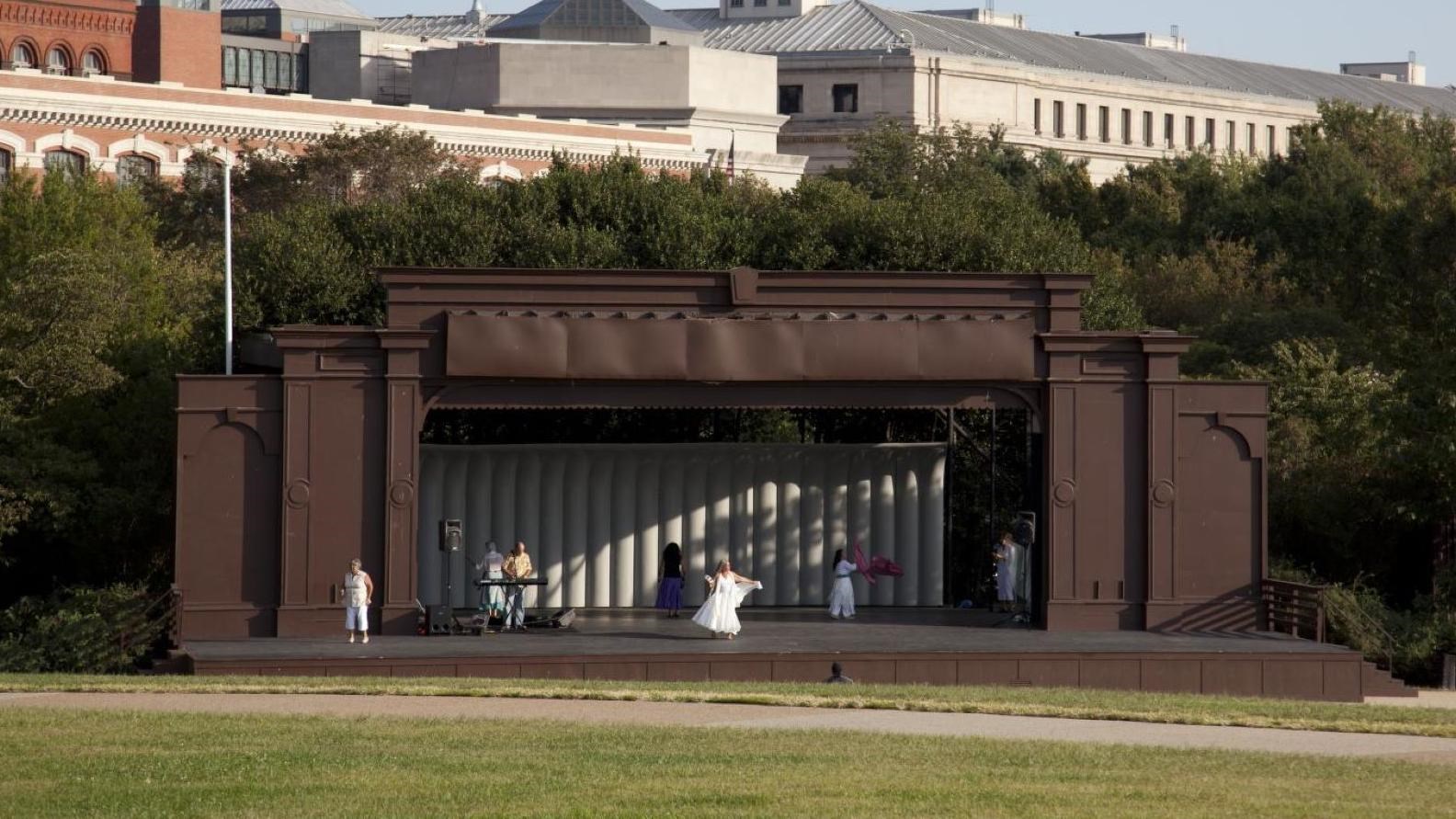Last updated: September 3, 2025
Place
Sylvan Theater

Historical/Interpretive Information/Exhibits, Restroom, Restroom - Accessible, Scenic View/Photo Spot, Water - Bottle-Filling Station, Wheelchair Accessible
A theater has existed on this site since 1917. While it has undergone various renovations, Slyvan theater has provided a public gathering space for music, theater, and first ammendment demonstrations for over 100 years. At this theater Rev. Dr. Martin Luther King Jr. spoke to roughly 26,000 people for the 1959 Youth March for Integrated Schools. In 1993 over 150,000 people attended two concerts.
Most recently the National Park Service has been educating and entertaining audeinces with ranger programs. Some topics that will be discussed are newly discovered infromation on the Washington Monument, the local pollinators you can find on the National Mall, and how Abraham Lincoln and the Civil War are connected to baseball. Below you will find a full list of dates and times for the ranger programs being offered this fall here at Sylvan Theater. Click the month for a full a list of events and programs happening on the Mall.
September 2025 (Programs begin at 7:30 pm)
19th - Peace on Earth and the WWI Memorial
“We Have Died. Remember Us.” This is the inscription on the Peace Fountain at the new National World War I Memorial on Pennsylvania Avenue in Washington, DC. The “War to End All Wars” was one of the most terrible conflicts in human history. And yet, there was compassion, comradeship, and love. Join us to learn more about this memorial and one of the most remarkable events in the history of war.
October 2025 (Progams begin at 7:30 pm)
3rd- In His Own Words- An Evening with Franklin D. Roosevelt
My friends! Join a Park Ranger to travel back in time to the 1930’s and 1940’s through the power of radio. Listen to clips from Franklin Delano Roosevelt’s fireside chats and hear for yourself how the president used the radio to build a relationship with the American people. FDR explains – in his own words - things like how he planned to end the Great Depression and get people back to work.
4th - Antebellum: The Road to the Civil War
Join rangers Caitlynn and Natalie at the Sylvan Theater to venture down the road that led the United States to Civil War. Many of us know about the Civil War, but few may remember how the terrible struggle came to pass, or why in 1861. Learn how events from the Louisiana Purchase to the blustering 1850 debates, to Bleeding Kansas, brought about the war.
10th - The Evolution of the National Mall
Have you walked around the National Mall and wondered how America’s Front Yard has changed through time? From its beginnings as a marshy wetland, people have shaped the landscape to meet their ever-changing needs and desires for the nation’s capital. Join Rangers Nick and Caroline as they take you on a journey over 200 years, uncovering the story of the land that would become the National Mall.
11th - The Second Coming: Washington and hte Whiskey Rebellion
Surely some revelation was at hand. The American Revolution was not settled when George Washington assumed the presidency. The Federal government found itself levying taxes and centralizing power. In response, people across the country rose up in armed rebellions. Washington was determined to hold the new country together. Find out how he responded, and how he created a new republic, in the shadow of his Monument.
17th - Stories of a Stage: Tales of the Sylvan Theater
What do Muhammed Ali, Woodrow Wilson, and the Lone Ranger have in common? They have all performed at the Sylvan Theatre on the National Mall. For over 100 years, Sylvan Theatre has hosted performers, politicians, and everyday people who came to make their voices heard. Join a ranger at Sylvan Theatre and hear the stories of this stage within a stage.
18th -Accidental Obelisk: The Origins of the Washington Monument
Why is the central monument of the National Mall an obelisk? The mystery may be found is the ancient past, and in the history of the Washington Monument itself. Discover with Ranger Abby how the iconic image of an obelisk made it from the ancient world to America's front yard.
